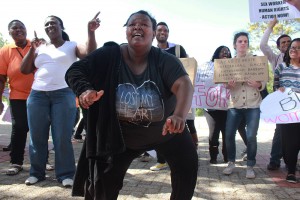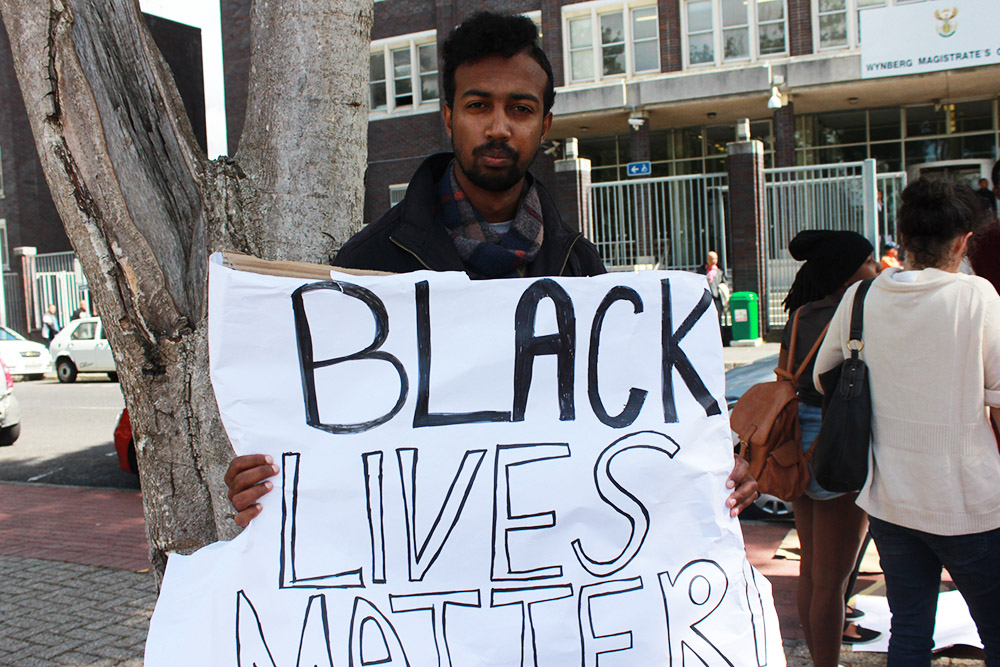Around 40 people converged on the Wynberg Magistrate Court on Thursday in solidarity with black women who have been discriminated against and to demand an end to the violence against sex workers. Cape Town has seen several racially charged assaults in recent months, including many against sex workers, and although these violations are usually silenced, for one morning, they were heard loud and clear.
That morning, protestors sang toyi-toyed outside the bleak courthouse, despite the looming clouds. The demonstration was organised by The Sex Workers Education and Advocacy Taskforce (SWEAT) and Sisonke National Sex Workers Movement in partnership with the South African Young Feminist Activists (Say-F).
The organisations had united in solidarity with Cynthia Jonie, a black domestic worker who was assaulted by a white swimming instructor, Tim Osrin. Osrin later justified the attack by saying he believed Jonie was a sex worker.
Outside the courthouse protestors chanted “Sex workers are human too, who are you to beat them upâ€, while Osrin was tucked away inside the building, waiting for his case to be heard. Protestors said they wanted to remind people that Osrin’s abusive behaviour towards Jonie is a violation that occurs regularly on South Africa’s streets.
“Tim Osrin’s violence against a black woman is not a new thing, it happens every day in this country over and over again, and we say enough,†said Ishtar Lakhani, human rights and lobbying officer for SWEAT.
The abuse sex workers endure is often swept under the rug. Sex work is a crime in South Africa, making it nearly impossible for sex workers to report an assault or rape, without incriminating themselves.
Angeline de Bruin, a former sex worker and member of SWEAT said she lived in fear of “the abuse, the brutalisation and the murders†that took place around her when she worked in Kenilworth – the same suburb where Cynthia Jonie was brutally assaulted. De Bruin said her fears have been renewed in the wake of Osrin’s cruelty.
“I was very scared. When I read that [he justified his violence by saying Jonie was a prostitute], I was scared for the sex workers,†de Bruin says.
The crowd outside the court was diverse. Women and men sang struggle songs together, while cars rushed by. Passengers in passing cars stuck their heads out of windows to shout “Awethu!†in response to the cries of “Amandla!â€.
The protestors said it’s well known that many areas around Cape Town welcome only a select few.
“White South Africans feel a sense of ownership over space, [they believe] that black bodies and coloured bodies don’t necessarily feel,†said Brian Kamanzi, a student at the University of Cape Town (UCT) who attended the protest in support of Jonie.
For Wansile Xaba, an organiser with Say-F, it is this type of power and control that makes black women vulnerable to attacks.
“It’s bigger than Tim Osrin, it’s bigger than those three UCT males,†said Xaba referring to the recent assault by three young men of a coloured woman at a popular Southern Suburbs shopping centre.
“It’s a structure that is called white supremacy. These males operate within this structure that allows them to inflict this violence on black bodies,†she said.
Although Osrin’s case was due to be heard it never came before the judge. happened. A series of clerical errors and confusions allegedly led to its postponement to 20 January next year.
News of the postponement angered protesters. But their numbers dwindled as the day progressed and eventually there was only a small group of mainly SWEAT members who toy toyed energetically in front of the court building, waiting for Osrin to appear, crying “Down with racism down!â€.

“Coward!†the shouted. “You strike a woman you strike a rock!â€
One voice cut through the commotion.
“Whether she was a domestic worker or a sex worker doesn’t mean that you must beat her. We have a right to do what we want to do. I’ve got a choice!,†shouted Duduzile Dlamini, her face is contorted with anger and conviction.
Osrin’s figure shrank as he walked into the police station next door, where he stayed a while before returning to his comfortable Kenilworth home.

![sex worker protest_1 [slider]](https://www.thedailyvox.co.za/wp-content/uploads/2014/11/sex-worker-protest_1-slider.jpg)










